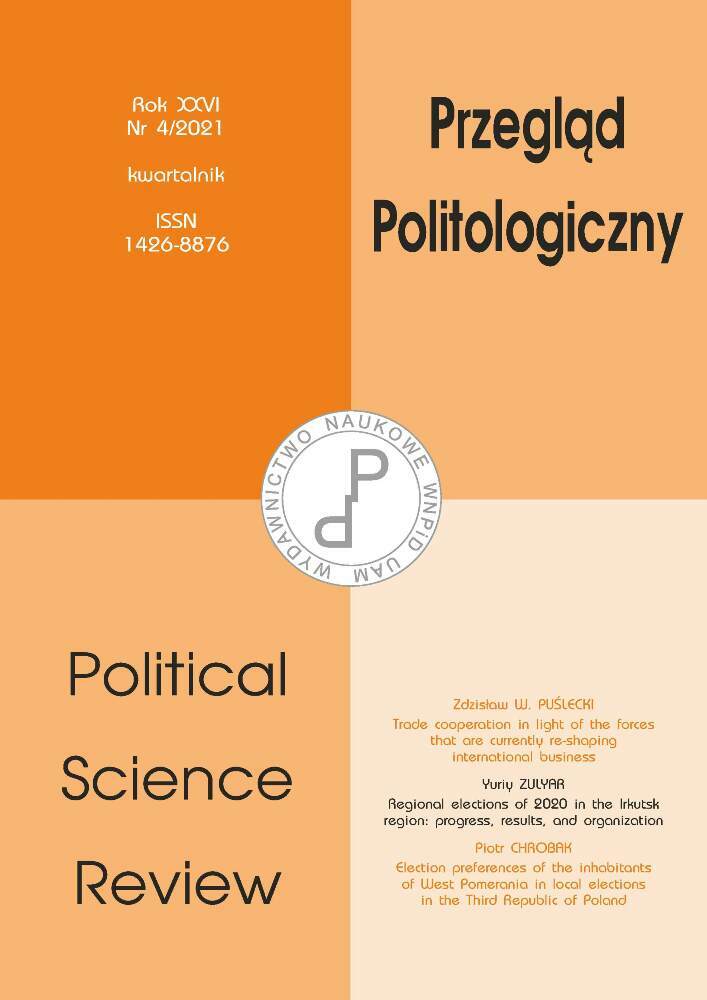Abstrakt
W artykule przeanalizowano autonomię samorządu lokalnego i świadczeń usług samorządowych w Nigerii. Badanie wykazało, że nigeryjski samorząd lokalny musi być niezależny w wykonywaniu swoich ustawowych obowiązków. Czynnikiem wzmacniającym świadczenie usług przez samorząd lokalny może być skuteczna agitacja różnych środowisk na rzecz niezależności samorządu Nigerii. Analiza wykazała, że niektóre stany w Nigerii sprzeciwiają się autonomii samorządów lokalnych ze względów politycznych i ekonomicznych.
Wykazano ponadto, że samorząd lokalny Irepodun (studium przypadku mikro) w Nigerii nie jest całkowicie autonomiczny. Chociaż samorząd lokalny w Irepodun jest przejrzysty i odpowiedzialny, zwłaszcza w zakresie identyfikacji, formułowania i realizacji swoich projektów. Musi on sprostać ogromnemu wyzwaniu finansowemu w realizacji świadczenia usług. W związku z tym badanie rekomenduje, usunięcie z konstytucji Nigerii zapisu dotyczącego wspólnego konta samorządowego, aby umożliwić alokację środków bezpośrednio do samorządów z konta Federacji. Należy zmusić państwo do regularnego przekazywania władzom samorządowym konstytucyjnych 10% ich wewnętrznie wytworzonych dochodów. Samorząd lokalny Irepodun i inne władze samorządowe w Nigerii powinny podjąć więcej wysiłków na rzecz trwałego tworzenia dobrobytu, zamiast polegać wyłącznie na dotacjach od rządu federalnego i władz stanowych.
Bibliografia
Abubakar S. (2017), Local Government and the 1999 Constitution, in: Politics and Political Power Relation in Nigeria, ed. M. Kwanashie, Oat and Partner, Zaria.
Anyebe D. (2017), On Democratic Dividends, “The Nigerian Tribune” of 9th January.
Adeyemo D. O. (2005), Financial and Administrative Procedure in Nigerian Local Government, Local Government publication series, Ile-Ife.
Ademolekun L. (2004), Public Administration; A Nigerian and Comparative Perspective, Longman Inc., New York.
Agagu S. (2004), Continuality and Change in Local Government Administration and the Politics of Underdevelopment, in: Development Agenda of Nigeria State, eds. A. Agagu, R. Ola, Fiag Publishers, Ibadan.
Akwara F. S. (2013), Political Experiences in Nigeria.
Almond G. A. (1960), The Politics of the Development Areas, Princeton University Press, Princeton, NJ.
Angahar A. P. (2013), The Impact of Existing Inter-Governmental Financial Relations on Effective Service Delivery at the Grassroots in Nigeria, “International Journal of Academic Research in Accounting, Finance and Management Sciences”, vol. 3.
Arowolo D. (2005), Local Government Administration in Nigeria: An Insider View, in: Local Government Studies, eds. D. Owolabi, A. Aladegbola, Excel Production, Akure.
Asaju E. (2010), The Idea of Local Government as a third tier level of government, in: L. Ademolekun, L. Roland, The NewLocal Government System in Nigeria: Problems and Prospects for Implementation, Heinemann Books, Ibadan.
Birch A. (2009), Reforming Public Service Delivery, “Journal of African Economies”, vol. 16, AERC Supplement 1, pp. 127.
Bolatito (2014), Issues in Nigerian Government and Administration, Denvic Publishing Company, Benin City.
Gboyega A. (2009), Sustaining Democracy in Nigerian Local Government: The Role of Legislatures, in: Contemporary Issues in the Social Sciences, eds. S. Akindele, C. Ajila, Ile-Ife.
Hassan K. (2011), Local Government in Nigeria: Relevance and Effectiveness in Poverty Reduction and Economic Development, “Journal of Economic and Sustainable Development”, vol. 1.
Ikeanyibe H. (2008), Local Government in Historical Perspective, “Nigerian Journal of Public Administration and Local Government”.
Odo A. (2014), Corruption by Examples: Legalizing the illegal as a Means of Survival in Modern Nigeria, “Bangladesh e-journal of Sociology”, 5(1), January.
Ojo E. (2009), Efficient management for local governments: The Nigerian Experience.
Okoli A. S. (2009), The challenges and opportunities for improving the Local Government System in Nigeria, Paper presented at the Third Biennial National Conference on Community Development in Nigeria held at Grand Hotel, Asaba.
Oladunjoye A. (2010), Some Thoughts on the Role of Local Government in Developing Countries (Nigeria), in: Local Government in West Africa since Independence, ed. A. Adamolekun, University of Lagos Press, Lagos.
Oviasuyi B. O. (2010), Management of intergovernmental relations in Nigeria: Problems and Prospect, “ASCON Journal of Management”, 3, pp. 41–50.
Roberts D. (1999), The theory and practice of federalism as a structural mechanism of governance: How adequate for gender struggle and representation in Nigeria?, “Anthropologist”, 5(3), pp. 169–178.
Weber M. (1946), Theories and Values of Local Government, “Political Science Studies”, vol. 18.
Wheare K. C. (2003), Federalism: National and International in Theory and Practice, Wheare, A Pager Publisher, New York, pp. 57–99.
Yahaya B. (2009), Local Government in Nigeria: An Overview of Structures and Functions, in: Key Issues in Local Government and Development: A Nigerian Perspective, ed. T. Onyishi, Praise House Publishers, Enugu.
Yusuf S. (2012), Local government autonomy and local government service delivery, “A Journal of Constitutional Development”, vol. 6, no. 2, pp. 21–45.

